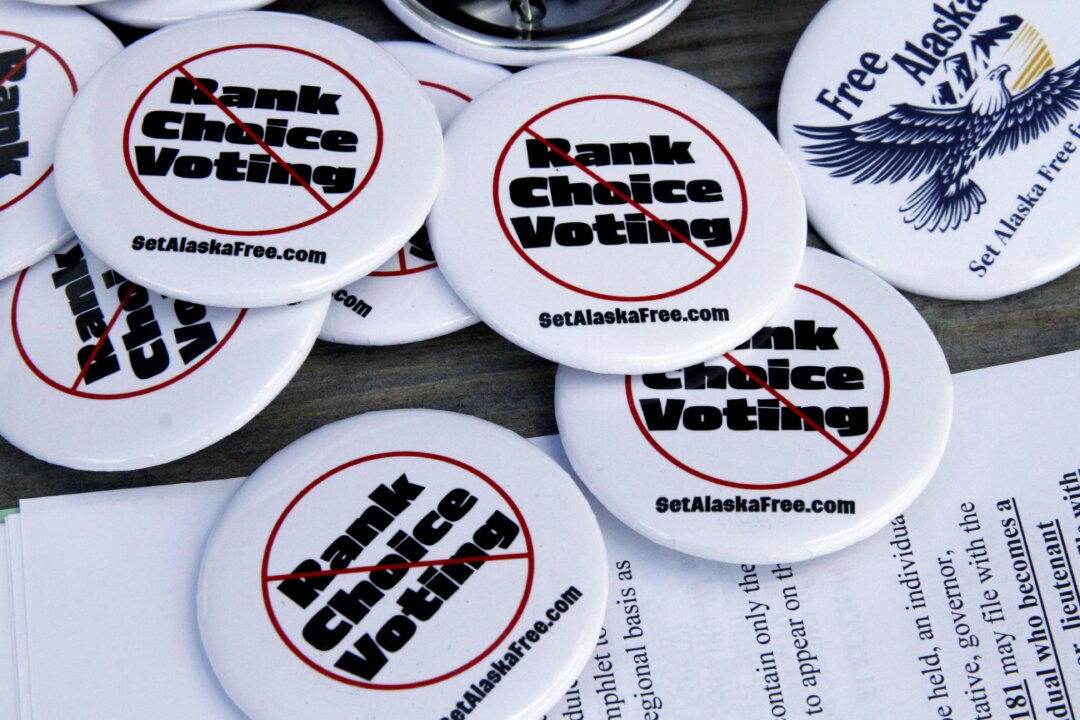A five-day trial, starting June 24, followed by a final ruling by Judge Rankin will determine the outcome of the proposal.
Alaskans might be voting whether to scrap or keep their ranked-choice voting system in November. Alaska’s ranked-choice voting system was introduced in 2020 and first enacted in 2022.
In an ongoing legal battle, a Superior Court judge on June 7 approved a motion in the first step that could ultimately scrap the ranked-choice voting system.
Opponents of ranked-choice voting had collected petition booklets to meet the requirements to place a repeal measure on the November ballot. Election officials allowed for some issues with the booklets to be fixed, and supporters of ranked-choice voting sued in April, alleging that Alaska’s Division of Elections improperly certified the measure.
Attorneys representing the plaintiffs argued the signature booklets should have been disqualified, which would have resulted in a lack of signatures to advance the measure to a November vote.
Judge Christina Rankin said in her ruling that election officials acted appropriately by allowing petitioners to fix issues with petition booklets.
The judge noted that minor amendments to the petitions could still pass beyond the deadline, as this was previously the case as per directives issued by the Division of Elections, dating back as far as 2015, deeming those small fixes a legal practice.
Ranked-choice voting allows voters to pick a preferred candidate from all candidates appearing on the ballot, regardless of party affiliation. The voter may then also select their second choice, third choice, and so on. If the top candidate gets more than 50 percent of the votes, they win. If not, the candidate with the least first-choice votes is eliminated and those ballots are added to the candidate the voter picked as their second choice. This is repeated until two candidates remain. The winner is the one with the most votes.
Proponents of ranked-choice voting say it is a justified option that gives voters more choice, especially to those who are unaffiliated. Opponents argue that it damages not just major parties but also smaller ones, by stopping them from appearing on the ballot. Instead, they say, it should be up to the party members to choose their candidate.
If ranked-choice voting is scrapped, voters would go back to picking one candidate on their ballot.
In her ruling, Judge Rankin said that the right to collect petition signatures is corroborated by the state.
“The right to initiative is a key feature of Alaska’s governance. Our Supreme Court has reiterated on several occasions that the right to initiative is not to be defeated by technical rule violations,” Judge Rankin said, citing a 2006 Alaska Supreme Court decision.
Furthermore, the Anchorage Superior judge said the plaintiffs’ argument constitutes “precisely the type of technical rule violation that warrants application of the constitutional principle of interpreting legislative procedures in favor of placing initiatives on the ballot.”
The judge said she will allow the plaintiffs to further argue their case based on expert testimony, which could point to other discrepancies relating to the signature-gathering process.
The expert is set to raise the issues during a five-day trial, starting June 24, followed by a final ruling by Judge Rankin by July 19. An appeal to the Supreme Court in Alaska is considered likely.
Meanwhile, as opposition to ranked-choice voting is also growing in other states, several states have moved toward implementing the voting method. The Colorado Supreme Court recently issued a ruling that an initiative focused on changing to ranked-choice voting can start gathering signatures, likely in time to appear on the November ballot.
From NTD News

